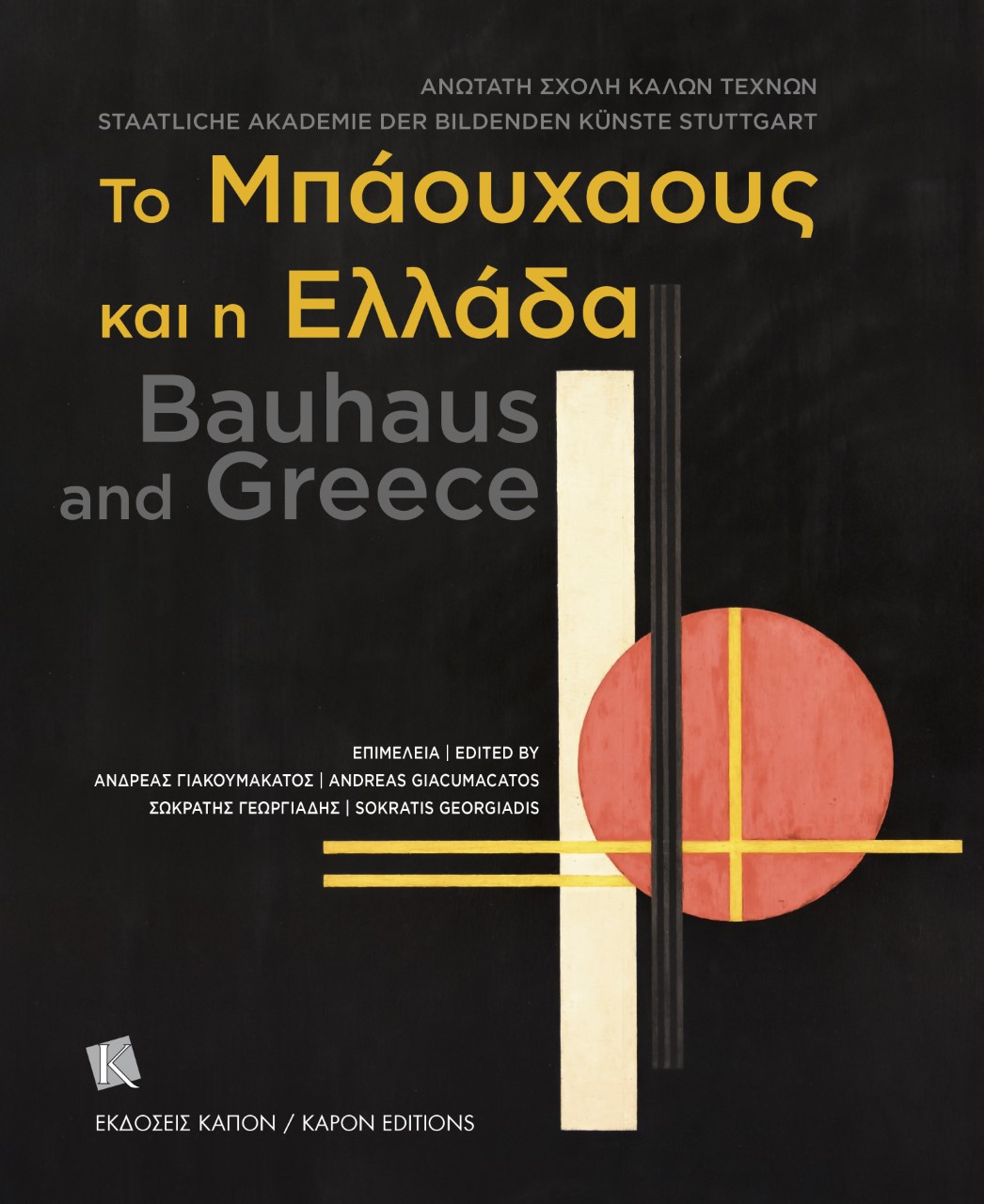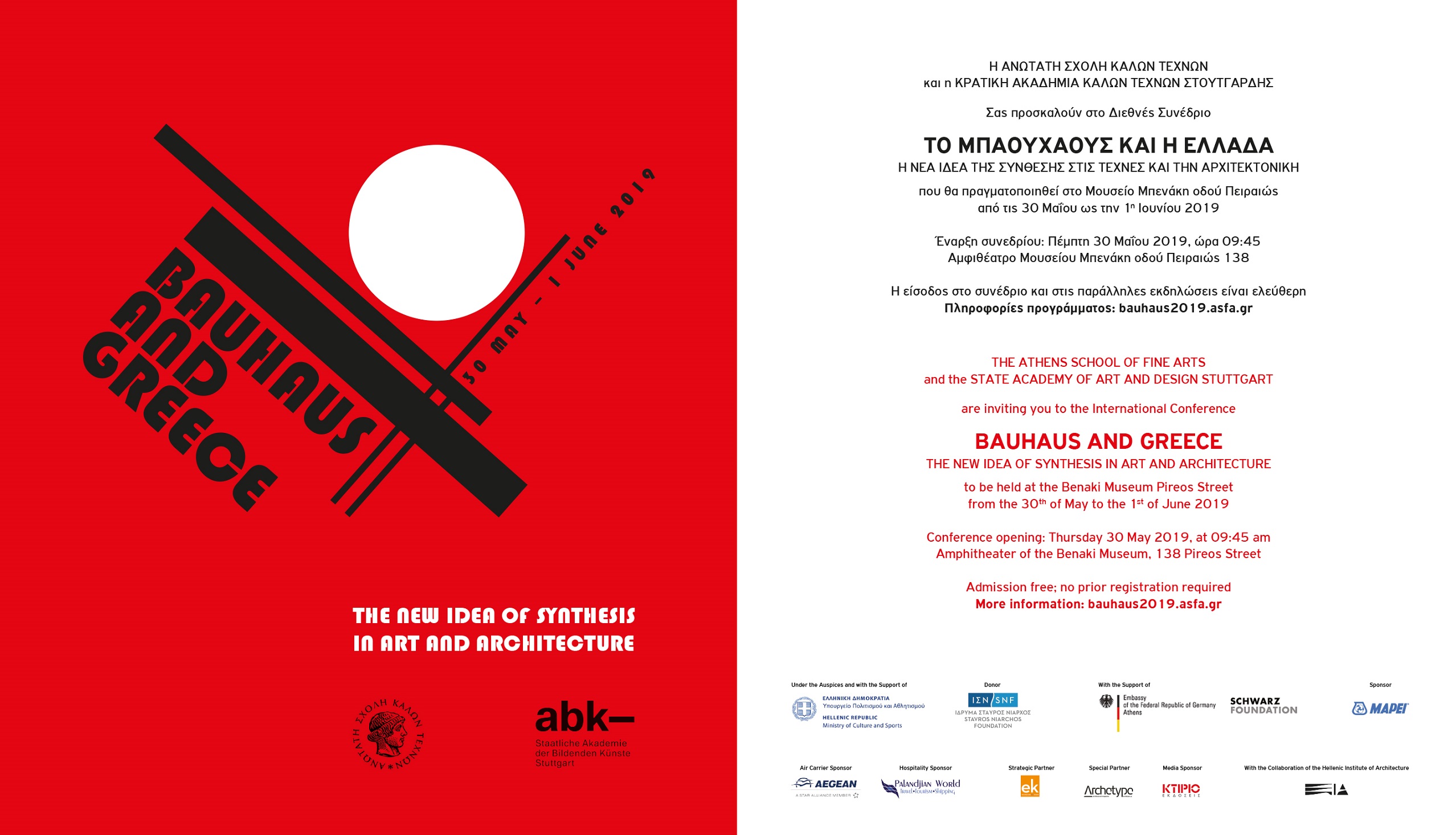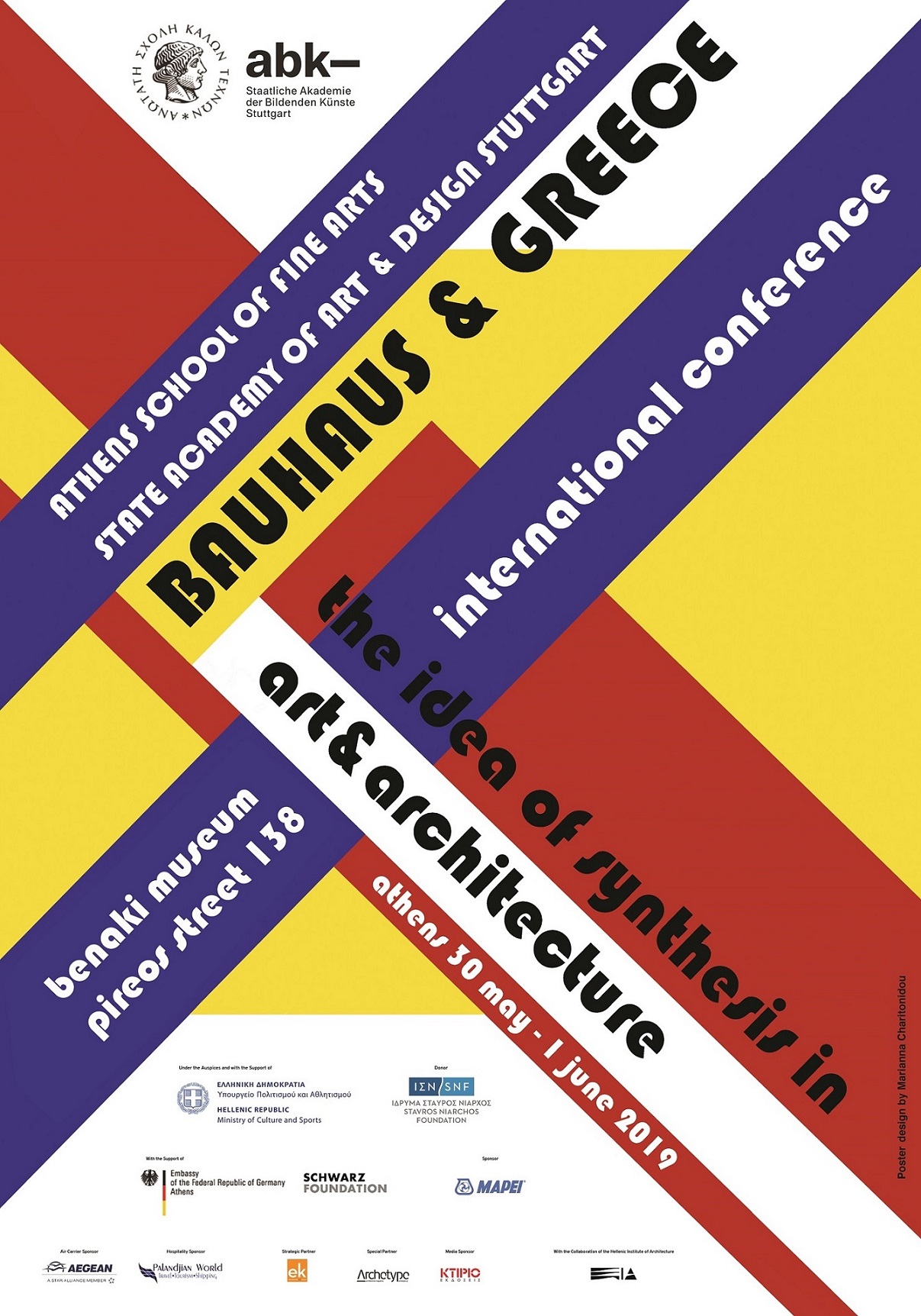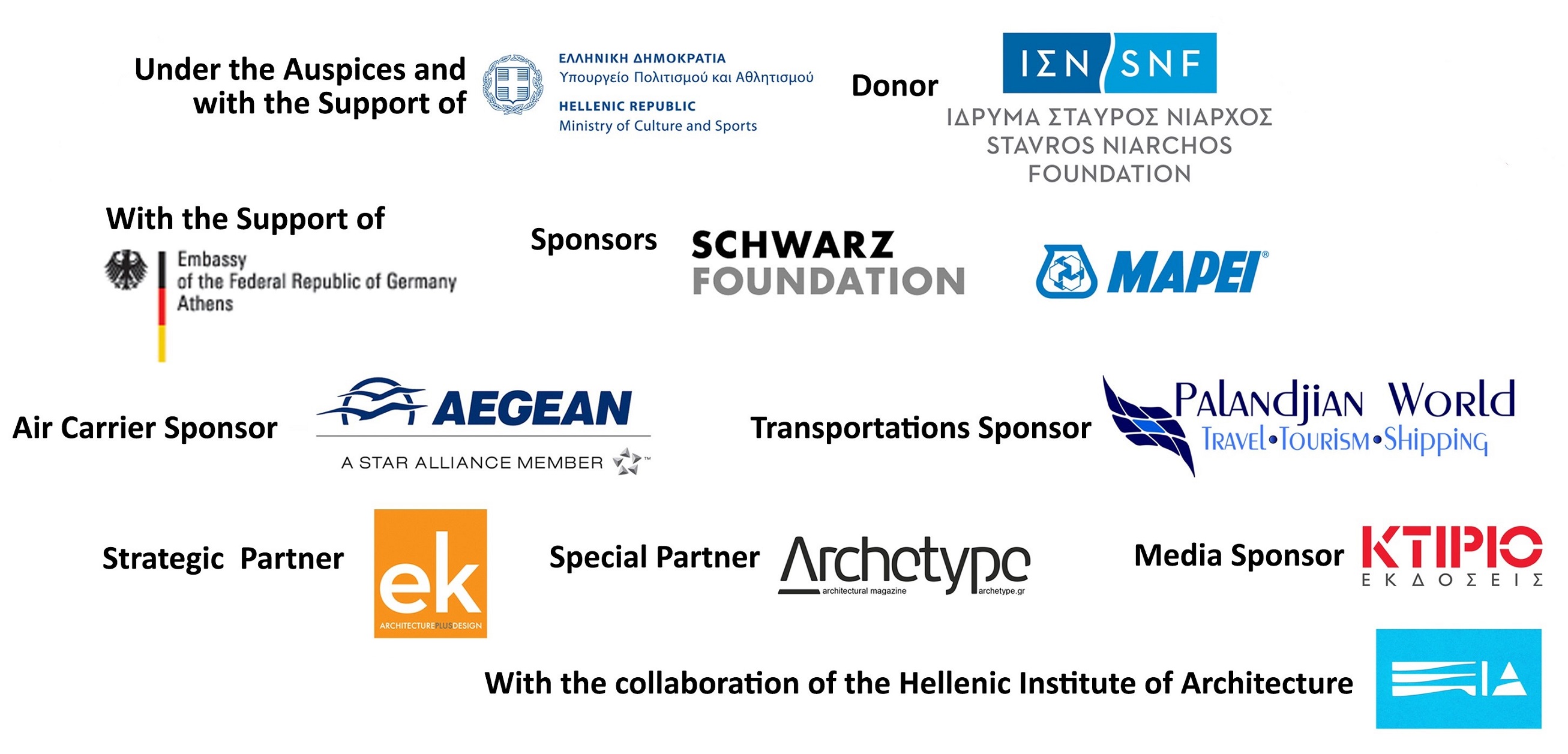

With the title Bauhaus and Greece. The new idea of synthesis in art and architecture, the volume of proceedings of the international conference held in Athens in May-June 2019 will be published on December 15, 2021. The 488-page hard-cover large-format and richly illustrated volume, in Greek and English, publishes the papers of 64 Greek and non-Greek authors. The papers, taken as a whole, contribute to an updated and in-depth analysis of the importance and influence of the Bauhaus school in Greece, Europe and the world over a century. The volume, with the preface by the Greek Minister of Culture and the support of the Greek Ministry of Culture and Sport and the Schwarz Foundation, is published by the Kapon Editions of Athens.
Andreas Giacumacatos, Sokratis Georgiadis (ed.), Bauhaus and Greece. The new idea of synthesis in art and architecture, Kapon Editions, Athens 2021, pp. 488.

The International Congress "Bauhaus and Greece" was held from 29 May to 1 June 2019 with great success at the Benaki Museum in Athens. It consisted of a three-day intensive academic block, three music evenings with music from the Bauhaus environment and the new edition of the book "The New School Buildings" (1938). The congress met with a great response from the public and was widely published in print and digital media at home and abroad. The audio-visual material on the congress will soon be accessible to the public.
With the conclusion of the congress, we would like to thank all those who contributed to the realisation and success of the "Athens Bauhaus 2019": the scientific advisory board and the organising committee, the congress participants and the sponsors who made the realisation of the programme possible.
Andreas Giacumacatos, Sokratis Georgiadis,





THE ATHENS SCHOOL OF FINE ARTS
STATE ACADEMY OF ART AND DESIGN STUTTGART
INTERNATIONAL CONFERENCE
BAUHAUS AND GREECE
THE NEW IDEA OF SYNTHESIS IN ART AND ARCHITECTURE
BENAKI MUSEUM (PIRAEUS STREET)
30 MAY - 1 JUNE 2019
International conference on Bauhaus to take place in Athens in May/June 2019, celebrating 100 years since Bauhaus foundation
- Programme includes talks by 65 international guests on Bauhaus reception in Greece and other countries before and after WWII
- Conference days will conclude with concerts mirroring original avantgarde concerts at first major Bauhaus exhibition in Weimar in 1923
- A new edition of ‘New School Buildings’, the most important interwar publication on modern Greek architecture, will be available at the conference for the first time
PRESS RELEASE
On the 100th anniversary of the founding of the Bauhaus in Weimar, The Athens School of Fine Arts and the State Academy of Art and Design Stuttgart are organising an international congress entitled Bauhaus and Greece: The New Idea of Synthesis in Art and Architecture. The congress will be held at the Benaki Museum on 30 May - 1 June 2019.
The 100th anniversary of the Bauhaus, this important event for the arts, architecture and art education, provides the setting for numerous festive events worldwide. The Bauhaus was founded in 1919 on the ruins of the First World War and under the dramatic circumstances of the Weimar Republic, which, like the Bauhaus, remained alive until the Nazi dictatorship in 1933. The Bauhaus is therefore a unique, non-repeatable educational and cultural experience of the European interwar period. In the 14 years of its eventful history, the school contributed decisively to the shaping of artistic and aesthetic orientations in the 20th century and, as a "classical" variant of our modern tradition, forms a fundamental point of reference up to the present day. However, the Bauhaus was not only a laboratory of industrial design and production and the development of a "machine style", but also formed the framework for multiple ideological approaches and political orientations with a view to creating a new social unity that would result in a new humanism. The Bauhaus was not one, but many, hence its aftermath as a point of reference and source of study and inspiration.
This is the main motive of the Athens Conference. Two topics will be dealt with in the three days of the meeting: The first topic is the Bauhaus reception in Greece and other countries before and after the Second World War. In the special case of Greece, the influences of modern European culture on the arts, architecture and art education during these periods will be discussed. The second topic is about other international initiatives that directly or indirectly referred to the Bauhaus or even aimed at its re-founding, such as the project of Mendelsohn, Wijdeveld and Ozenfant to create a Mediterranean Academy, the Black Mountain College in North Carolina, the New Bauhaus in Chicago, the "White City" of Tel Aviv, the Hochschule für Gestaltung in Ulm and others.
About 65 congress participants from Greece and abroad will contribute to these topics. Invited guests from the fields of art and architectural history will address the character and significance of lesser-known aspects of Bauhaus history.
Further highlights can be expected during the Athens Bauhaus anniversary. In August 1923, on the occasion of the first major Bauhaus exhibition in Weimar, two concerts with works of modern "classical" music by avant-garde composers of the time such as Ernst Krenek, Paul Hindemith, Ferruccio Busoni and Igor Stravinsky took place. It was, so to speak, a musical counterpart of the Bauhaus, on the basis of a musical paradigm that would later be branded as "degenerate". These concerts will now be performed again in the Benaki Museum in the evening, in conclusion of each congress day. The last evening will be dedicated to the jazz music of that time, which was known to be one of the musical preferences at the Bauhaus. The artistic director of the Athens Bauhaus evenings is conductor George Petrou. The concerts are organized under the support of the Embassy of the Federal Republic of Germany in Athens and Schwarz Foundation.
The "Greek contribution" to the Athens Congress will be rounded off with a new edition of the most important interwar publication on modern Greek architecture. It is the now legendary, extremely rare volume New School Buildings, a documentation of the structures widely known as "Papandreou's Schools" of the second Venizelos government period (1928-1932), which Patroklos Karantinos edited in 1938. Spread across the country, these schools, where several generations of pupils were educated, are the clearest and most revealing testimony to the desire for modernisation and the intensity with which the messages of modern European architectural culture were incorporated into Greece in the 1930s. The book is published by Kapon Editions, thanks to an exclusive grant by the Stavros Niarchos Foundation.
A three-day intensive, multi-faceted festival programme with scholarly, editorial and artistic aspects is expected, a contribution to the outstanding importance of the event.
Idea, organisation and realisation of the conference:
Andreas Giacumacatos, Professor of History, Critique and Theory of Architecture at the Department of History and Theory of Architecture of the Athens University of Fine Arts, +30.6936829868, This email address is being protected from spambots. You need JavaScript enabled to view it.
Sokratis Georgiadis, Professor (ret.) for History of Architecture and Design at the Department of Architecture of State Architecture of the Fine Arts Stuttgart, +49.1729966563, This email address is being protected from spambots. You need JavaScript enabled to view it.
General information about the congress: bauhaus2019.asfa.gr
- Languages of the congress: Greek and English with simultaneous interpretation
- Participation in the congress is free, prior registration is not required.

-Deadline for full paper submission, 4500 words max. including footnotes, up to 8 images: Friday, 17 May 2019.
-Each paper presentations should not exceed 17-20 minutes.
1st Comunication, December 2017
For the 100th anniversary of the foundation of Bauhaus, The Athens School of Fine Arts and the State Academy of Art and Design Stuttgart are organising an International Conference titled ‘Bauhaus in Greece’. The conference will take place in Athens from 30 May to 1 June 2019.
Bauhaus was the most important art school and the motor behind modernity in the 20th century. It was the result of converging historical conditions after the First World War. These conditions include the economic crises of European democracies, the search for alternative ways to satisfy collective needs, and the severing of historical ties under the radical pressure from artistic avant-garde movements. Beyond that, the foundation of Bauhaus was closely related with Germany’s specific post-war situation. The trauma of war played a significant role in this, as did the horror caused by the industrial-scale annihilation of millions of human lives, the feeling of national humiliation that came with losing the war, and the Reich’s economic, political and cultural collapse. Bauhaus as a cultural promise was, to an equal extent, linked to Germany’s hopefulness for the future resulting from the foundation of its first republic. They both came to an end under a common banner: the Nazis seizing power in 1933.
Bauhaus drew its ideas from the Arts and Crafts Movement and the Deutscher Wekbund. At first, Bauhaus aimed to bridge the gap between art and craftsmanship, and then to reconcile art with industry. Further, Bauhaus was about realising the idea of synthesis at various levels – synthesis as a cultural programme, synthesis as form, and synthesising the industrial production of objects for mass consumption on the one hand with the quality of authentic artistic achievement on the other. For this, collaboration between artists and architects became possible for the first time, and, straight after the end of the war, Bauhaus became the central point of reference for the artistic avant-garde and especially for the European modern movement. An important aim of its founder Walter Gropius was the school's international character, which he strove to achieve by employing teachers from all over Europe.
At that time, Greece was undergoing its own tragedy, caused by the catastrophe that had resulted from the Graeco-Turkish war in 1922, as well as by the collapse of the Great Idea. The catastrophe moved the country into a state of comprehensive self-inspection, which was aimed at clearing up questions of identity and the general direction of its national cultural production. This does not mean that, during the period before, Greek culture had shown itself to be particularly open and receptive towards the challenges coming from European avant-garde movements. The 1920s, however, played a crucial role in the shaping of Greece's national cultural physiognomy – with the teaching and work of Dimitris Pikionis, with Fotis Kontoglou, Spyros Papaloukas, Manolis Kalomoiris, Aggeliki Hatjimichali, and Aggelos Sikelianos, along with the Delphic Festival that he had initiated. It was only in the 1930s that the desire for an intensive exchange with European trends gained strength, with Nikos Hatjikyriakos-Gikas, Nikos Eggonopoulos, Andreas Empeirikos, Nikos Skalkotas, Nikos Mitsakis and Patroklos Karantinos as the main actors. From this came decisive impulses towards the country's cultural positioning, as well as the self-determination of its creativity in the context of an international dialogue, especially in the arts and in architecture.
The conference will comprise two general thematic areas:
1. Bauhaus's significance for and influence on the arts and architecture in Greece.
2. Bauhaus's influence on other countries in comparison and on art education.
Determining the co-ordinates of Bauhaus's reception in Greece in the interwar period will be the topic of the first thematic area. In this context, the effects of the Bauhaus experience on the work of Greek artists, architects and designers will be up for discussion. We welcome contributions that will sharpen our understanding of Greece's autochthonous production by investigating possible Bauhaus influences. We also invite contributions that will highlight the significance of international exchange and the presence of Greek artists and architects of that time on the international stage. This will be an endeavour to re-evaluate two things: first, the 'Greek contribution' to European interwar culture, and second, the significance of Bauhaus's heritage and myth for art and architecture in interwar Greece.
The international thematic area will draw attention to the reception of Bauhaus in other countries before and after the Second World War. Contributions will expand on the German Bauhaus experience (1919-1933) to give an understanding of events such as the 1938 Bauhaus exhibition at the MoMa in New York; Mendelsohn, Wijdeveld and Ozenfant's project to establish a Mediterranean academy; the foundation of Black Mountain College in North Carolina and New Bauhaus in Chicago; the 'Bauhaus' architecture in Tel Aviv; the foundation of the Ulm School of Design; and the idea of an Imaginary Bauhaus in the context of situationism.
The conference will be accompanied by publications and further events on Bauhaus culture, which will be announced in due course.
• General information: bauhaus2019.asfa.gr
• Please submit your abstract to This email address is being protected from spambots. You need JavaScript enabled to view it.. You can use this address for related queries.
- Friday 25 May 2018 - deadline to submit abstract
New deadline for submitting abstracts: 30 September 2018
Due to the great interest in the conference, the new deadline for submitting abstracts is September 30, 2018. The thematic areas and specifications remain unchanged. It is also self-evident that all abstracts submitted till now are valid.
The languages of the conference are Greek and English. There will be simultaneous translation.
Abstracts can be submitted in Greek or English.
A joint Communication from two rapporteurs can also be made in the Conference.
Conference records will be published.
Participation is free of charge.
The attendance of the conference does not require prior registration.



